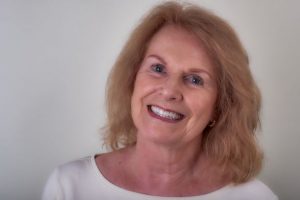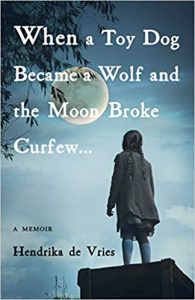From May 1945 to COVID-19: Reflections
 By Hendrika de Vries
By Hendrika de Vries
I have found one of the lovely surprises about growing old if you are lucky, is that you become part of a web of friends, colleagues and family members who span the planet. Over the years they stretch your mind and enrich your life by their diverse cultural lifestyles, beliefs and rituals, and personal myths.
At Easter, some celebrate by attending the church of their choice; others feel more attuned to the ancient goddess of spring and renewal, Eostre, from whose name Easter was ostensibly derived. Many of them celebrate the sweetness of spring with egg hunts for children and grandchildren or honor nature’s gift of renewal by planting their gardens. And in Australia, where I lived during my most formative years, they remind me that the equinox marks fall in the Southern Hemisphere, which challenges me not to see the whole world through the lens of my European origins.
But in this year of the coronavirus lockdown of our world, we each in the private spaces of our social isolation are challenged to contemplate more deeply the meaning in suffering and death. We reflect on our sacred stories and nature’s cyclical renewals for assurance that darkness and suffering, even death, do not have the final word in the grand adventure of life.
With deepening awareness of our interdependence, we reach out to one another on our various digital devices and reimagine the world we want our grandchildren and their children to inhabit.
When I was seven years old, my mother turned on all the lights in every room of our apartment in Amsterdam and marched me into the kitchen where she struck a series of matches and lit every jet on our gas stove including the oven. She placed two straight backed kitchen chairs next to each other facing the open oven door and commanded me to “sit”.
I climbed on one of the chairs and felt the blast from the gas jets and open oven heat my face and the full front of my body. My mother sat next to me. “I want you to feel this warmth and see all the light and always remember it”, she said. “We are facing cold, dark days, but … I want you to know that no matter what happens, all this light and warmth will return.”
The following day all electricity and gas were turned off indefinitely in the city of Amsterdam. We faced one of the coldest winters on record. Our daily food supply would dwindle from 800 calories to 500 to 200 to nothing in the following six months. I would learn to eat tulip bulbs and watch old men collapse and die of hunger and cold on the streets near our home. No, there was no toilet paper.
Some 20,000 people died of cold and starvation. My mother and I were among the lucky ones who survived. Miraculously, life renewed and resurrected itself and taught us to experience joy again. Thousands of babies burst upon the planet by the following spring, the first of the explosion of baby boomers who set about to change the world.
It has been seventy-five years since the spring of Amsterdam’s liberation in May of 1945. This spring I celebrate Easter with my husband in California, isolated in our home because of the novel coronavirus. We still treasure the tiny cloth bunnies we gave each other on the first Easter after we met, fairly late in life. Mine sits on the control panel in his car. His on my desk near my computer.
We connect with friends and family via Skype and Zoom. Two doves coo as they mate on the balcony outside our living room. A pair of finches have decided to create a nest in the potted fern that hangs in our carport. Memories of Easter rituals past resurface in my mind’s eye.
A curly-headed little grandson, now a grown man, stumbles as his basket filled with eggs rolls down the slope of our front yard. His mother scoops him up and they chase his eggs down the hill both whooping with laughter. It seems only yesterday that my young granddaughter, now twenty, practiced her artistic skills on our back deck as she painted two dozen boiled eggs with wild imaginative designs. I marvel at the cycles of life that I have been privileged to experience and the way the arc of human history, despite its often cruel and destructive detours, ultimately bends towards courage and love.
As my mother said, “The warmth and the light will return.” While we hide indoors from a virus that attacks our lungs, Mother Nature has a chance to breathe. In our Northern Hemisphere the sun shines a little warmer each day, daffodils push up through frosty winter ground and bare trees slip on their spring greenery. And even in the Southern hemisphere where life prepares for winter instead of summer, the Prime Minister of New Zealand, who has wisely placed her nation in total lockdown, has given the Easter Bunny special dispensation to hop around.
—
Hendrika de Vries is the author of When a Toy Dog Became a Wolf and the Moon Broke Curfew: a memoir about her childhood in Nazi-occupied WWII Amsterdam.
Her memoir has been awarded the 2019 May Sarton Women’s Book Award.
Read more on www.agirlfromamsterdam.com
WHEN A TOY DOG BECAME A WOLF AND THE MOON BROKE CURFEW

When a Toy Dog Became a Wolf and the Moon Broke Curfew, Hendrika de Vries (Author)
Born in the Netherlands at a time when girls are to be housewives and mothers and nothing else, Hendrika de Vries is a “daddy’s girl” until her father is deported from Nazi-occupied Amsterdam to a POW camp in Germany and her mother joins the Resistance. In the aftermath of her father’s departure, Hendrika watches as freedoms formerly taken for granted are eroded with escalating brutality by men with swastika armbands who aim to exterminate those they deem “inferior” and those who do not obey.
As time goes on, Hendrika absorbs her mother’s strength and faith, and learns about moral choice and forced silence. She sees her hidden Jewish “stepsister” betrayed, and her mother interrogated at gunpoint. She and her mother suffer near starvation, and they narrowly escape death on the day of liberation. But they survive it all―and through these harrowing experiences, Hendrika discovers the woman she wants to become.
Buy the book HERE
Category: On Writing
























